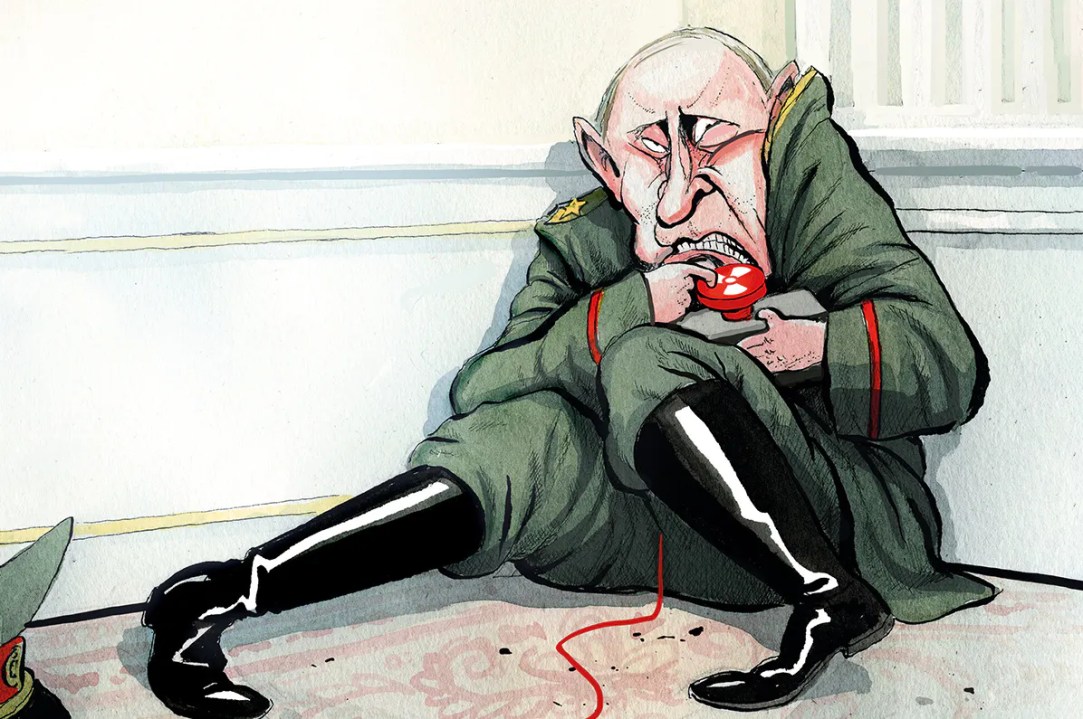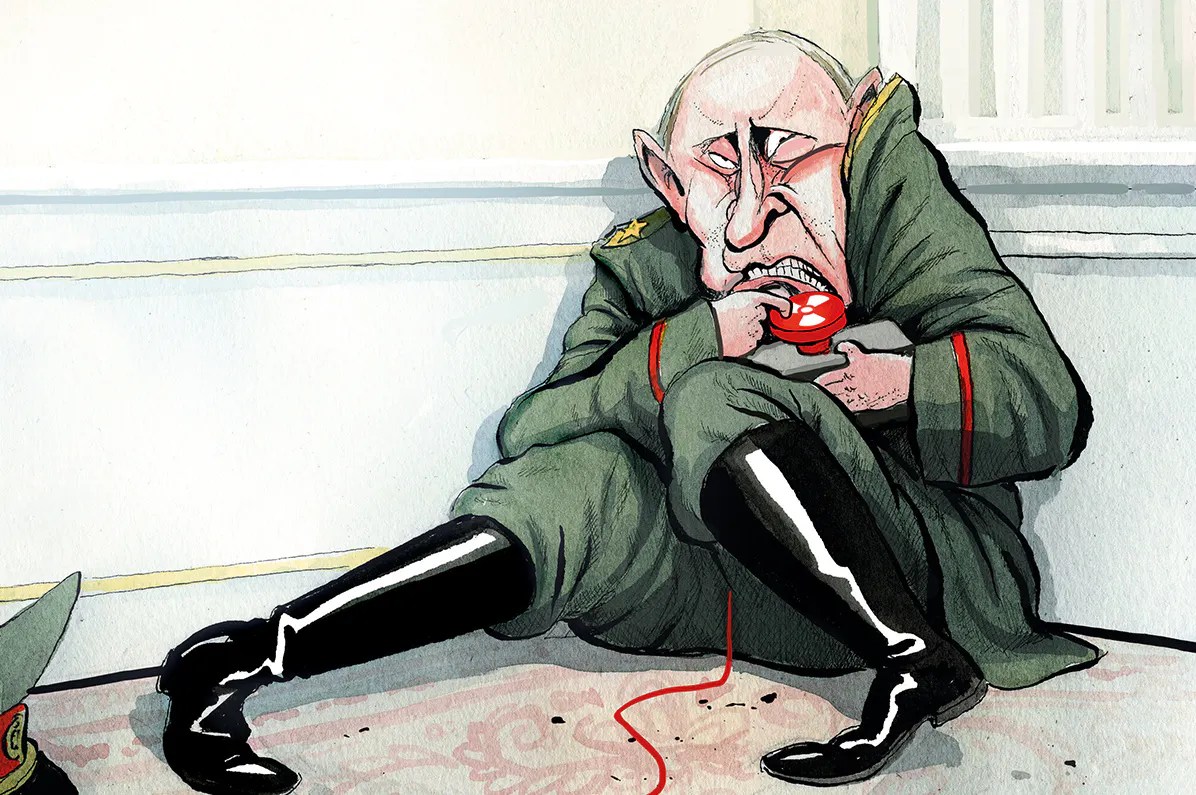If you were Putin, what would you do? Predicting your adversary’s future moves requires putting yourself in his shoes. As Russia’s misadventure in Ukraine nears its first grim anniversary, we should ask ourselves how Putin sees the world, indeed – how we would see the world and what policy we would pursue if faced with a range of unpalatable options.
Option one. He could declare the war lost and withdraw. If I were Putin, I would not choose this option. Why? There is grave danger in admitting defeat. Russia was built on the myth of infallibility. While the hope of victory stays alive, the people will follow the Tsar. But no sooner will he back down then they will turn away from him because the Kremlin is no place for losers.
If I were Putin I’d tell myself that I am still popular. They thought they’d topple me – they don’t know our people. The Russians are afraid of uncertainty more than they are afraid of tyranny. They would readily embrace terror if I only wanted them to. You think Navalny has it bad? I’ve kept him alive, I would say, just because I can. He is allowed to share stories of his misery with the world: that’s how I show my power.
No, they won’t pour into the streets to demand my head, not unless I show weakness. That’s why I cannot back down. That’s why I annexed Kherson and Zaporizhzhia – to show them that I am all in.
I cannot accept defeat because Russia’s influence in its near abroad would collapse. My so-called allies in Central Asia and the Caucasus (who have proven so unreliable – I’ll yet pay them back for their disloyalty) are eagerly awaiting Russia’s demise. I cannot allow them such satisfaction. By contrast, I must show them that the costs of resistance are high, so they learn to respect me.
Option two. Obtain a freeze. We retreated in Kherson. It was the right decision. We can now consolidate our positions and dig in, making it more difficult for the Ukrainians to attempt what they pulled off outside of Kharkiv. I might then proclaim that we have made strategic gains: secured a land bridge and established full control over the Sea of Azov. I can sell this as a victory to the public. I know they want some return to normality. But there is a catch.
I doubt that I can bring Zelensky to accept the status quo. What’s in it for him? He has new weapons. He has confidence, born of unexpected victories in the autumn. He will press on. The Ukrainians have smelled my blood, and they are going in for the kill. They won’t stop until they push me out of Ukraine. They are waiting for the opportunity to do that in the spring. And they will try, no doubt. They understand that they are disadvantaged in the long term. They depend on American largesse. They depend on the West not becoming distracted and preoccupied with other problems. They need the West to keep them afloat – economically and militarily. Will the West keep doing it? Maybe. But I sense fatigue.
So, a ceasefire, if it comes, will be short and sweet. No sooner have we regained some strength that we will strike again. Because if we don’t – they will.
Option three. Fight until we have a de facto partition of Ukraine. Time will tell how far west the line will run. At the very least, we must recapture the territories that I have already annexed. Then I can say I have accomplished my goals and proclaim victory. Do I have any incentive not to? Will the West relent on sanctions if I moderate my goals in Ukraine? They won’t. They only understand force, and only my decisive victory on the battlefield will impress them. Until then, they will jeer and cheer on the Ukrainians. Why, I would do exactly the same if I were in their shoes.
Surely the war is not lost – I would tell himself – not yet. True, we haven’t done as well we hoped but nor have we exhausted our potential. The population is docile. My partial mobilisation plugged the holes in our defence with hardly a stir among the public. I could easily mobilise ten times more. I just don’t have anything to equip them with. In time, I will. Yes, we are running low on ammunition, but we can build it up over time, while drawing on supplies from Iran and North Korea.
They tried to cripple us with sanctions, but they couldn’t. The situation is not great, I know, but I have an excellent economic team. The numbers show only a minor decline this year and economic stabilisation a year from now. Unlike Ukraine which has been devastated.
Russia is a nuclear power, and so I can’t lose. Would Hitler have used all the means at his disposal if he could avert Germany’s defeat? Yes, he would. That’s my premise, too. I will push forward, until I have no options left. With God’s help, I will win, but if don’t, I am not averse to dying in glory. We all must die someday. Why not today? Why not in the service of the Great Russian Idea? That is what they don’t understand. They think I will flinch when faced with the choice: defeat (and my humiliation, and even ouster) or the end of civilisation. Had the end of civilisation ever looked more attractive?
But civilisation does not have to end – not at all. There is a long way to go from irradiated Ukraine to a global nuclear cataclysm. They – the Americans – will have to make the choice to escalate. Will they? I doubt it. They know that I know that in the big scheme of things, Ukraine is a side show. For them, that is. Not for me. For me it’s a matter of life and death. For now, I will keep the nuclear card in reserve. Some say it’s just an empty threat. Maybe it is and maybe it isn’t. Let’s find out when it comes to it.
These are my options, I’d tell myself, grasping the sides of my armchair like it was my only friend, and that’s why the war will continue until the bitter end. Ukraine might be turned into a wasteland in the meantime – so what? There might be more suffering and more deaths – do I look like I care? Victors are never judged. I know this as well as they know it at the Hague. And in the end, there may be a nuclear war. If it comes, it will be God’s will.
Is this how Putin sees the world? Is this what he is thinking? We have no way of knowing. We are endowed with reason so we can make choices, and yet if history holds one lesson for us, it is that we often make bad choices, and then more bad choices to salvage a situation we have made worse by making bad choices in the first place. Putin blundered into a war in Ukraine. Now he must double down to win.
He knows – and we know – that the war hasn’t gone well for him, so far at least. But nor has it gone disastrously wrong – yet. Russia is holding together. It is adjusting to its new reality of a perpetual conflict with the West. The elites have accepted their fate and rallied around the Tsar.
Putin is betting on his success in a long war. He knows his victory is far from certain. But he reckons that he has a fair chance to weather it out and obtain through methodical brutality and perseverance what he failed to get in a display of chutzpah a year ago.
If this is what he thinks – and it is probably a fair reflection – we, too, need to steel ourselves for a painful struggle that may take years before it is resolved in one way or another. When Putin sees the world through our eyes, does he see unflinching conviction and a willingness to go to the brink? He probably doesn’t. That too contributes to his confidence.
A year on, there is light at the end of the tunnel. It’s Putin burning down his off-ramp as he prepares for a long, long war.








Comments